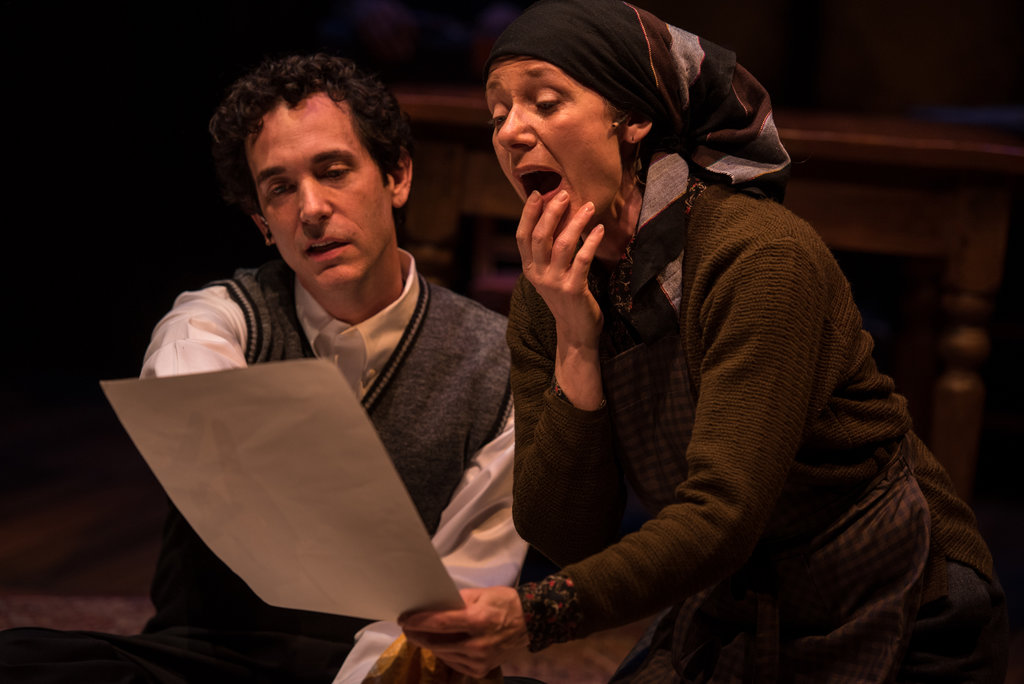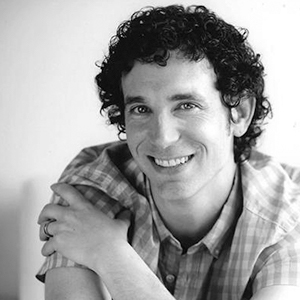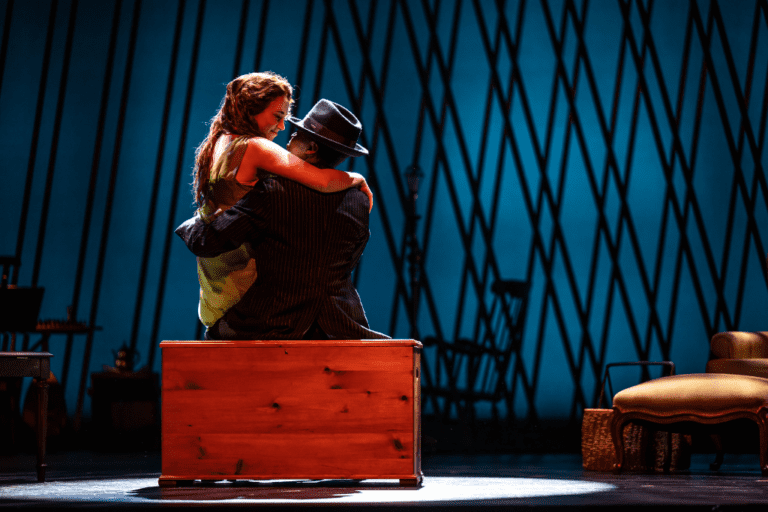When My Art Hurts the People Around Me
My debut as a film actor was in the 2001 Canadian feature Inertia, and, in the first scene of the movie, I appear completely naked.
Not, like, Grey’s Anatomy naked, where I’m under a sheet and as I slide out you sort of catch a glimpse of the side of my butt.
I mean completely, no-holds-barred, fully frontal, buck-naked.
The decision to do a nude scene was not made lightly, and the actual shooting of the scene was not easy for me. But I’d been involved with the movie for years, and I had a hand in the development of the script (it was written based on a year of improvisations with the actors), and I trusted the director (he was also one of my best friends), and I really, truly believed in the project. And I understood the nudity was essential to the story.
But it is quite possibly the most difficult thing I’ve ever done, professionally speaking. I mean, that shit is permanent. There’s no “undo.” You can’t yank those images from the internet. You can’t change your mind once it’s out there. Nude scenes are forever.
Luckily, it worked out pretty well. The movie premiered at the Toronto International Film Festival, where it won an award and helped launched the careers of everyone involved (which, I’m pretty sure, had little or nothing to do with my genitalia being featured in the opening scene).
But perhaps the most surprisingly positive outcome of my big nude scene was the freedom it afforded me from that point on. I felt like, artistically, I had nothing left to hide. Everyone I knew—family, friends, co-workers, the creepy guy who worked at my gym—had seen me naked. Something about the purity, the vulnerability of it all, was strangely liberating. This newfound freedom influenced the direction my career took over the years since, culminating in my writing, producing, and playing the lead role in the 2012 movie My Awkward Sexual Adventure. It’s a comedy, in case you couldn’t glean that from the title, and, yes, it’s sexual. And awkward. Very, very awkward.

Jonas in My Awkward Sexual Adventure
Making My Awkward Sexual Adventure wasn’t easy either, and while I was mercifully able to avoid full-frontal nudity this time, I found myself confronting a whole new set of challenges around the very explicit, very embarrassing nature of the film. Back when I made Inertia, I was pretty much on my own in the world. But at the time of this new film, eleven years later, I was married with a young daughter and another on the way. Suddenly, my artistic decisions had repercussions that extended beyond myself.
This is a quandary that I continue to wrestle with on a regular basis. In fact, it was one of the main reasons I decided to return to the theatre after an eight-year absence. Allow me to explain…
Actors are always looking for a “way in.” When we begin the process of inhabiting a character, we’re on the lookout for a deep personal connection, something that ties us to that character, a passageway that allows us to “understand” who they are and what they’re going through. Sometimes we find a way in, and sometimes we don’t.
When I first read the script for Aaron Posner’s adaptation of Chaim Potok’s novel My Name Is Asher Lev, I immediately saw my way in.

My Name is Asher Lev. Photo by Dahlia Katz.
No, I’m not an observant Jew like Asher Lev (though I can speak a little Hebrew and I’ve been to Israel a couple of times) or a prodigy in the New York art world (though my seven-year-old thinks I draw a pretty impressive Harry Potter), nor do I have a troubled relationship with my parents because of my career choices (they both think the actor’s life is fun and exciting).
Asher realizes at around age six that he’s an incredibly gifted artist—a prodigy—and spends the next decade of his life honing his skills painting nudes and crucifixions (neither of which are very Jewish). Throughout this process, his deeply religious father becomes increasingly troubled, and the gap between them threatens to grow into a chasm. What’s most compelling about My Name is Asher Lev is how Asher himself navigates this conflict, torn between his burning need to express himself through his art and his profound love and respect for his father.
The play never simplifies this conflict, because there’s nothing simple about it. Asher’s artistic drive is profoundly challenged by the conflict it causes those he loves the most. I had experienced this exact conundrum myself when I made My Awkward Sexual Adventure.
I had my way in.
My Awkward Sexual Adventure is a raw, honest, vulnerable investigation of male sexual anxiety, explored through the filter of a sexy romantic comedy. In the film, I play a nerdy accountant who goes on an embarrassing quest to learn how to become a better lover. Humiliating comic hijinks ensue. The story, I should clarify here, is completely fictional. But the themes of the film—and the difficult and vulnerable questions it raises—reflect a common experience that most men have shared, at one time or another. Whether they admit it or not.
Throughout the twelve years of developing, exploring and, ultimately, discovering the script for this movie, I became increasingly committed to telling an honest and frank story about the sexual insecurities of the modern man. I felt an obligation to the truth, regardless of the consequences, whatever the expense. This sense of responsibility is also what drives Asher. And just as Asher struggled with how his art affected his parents, my own process wasn’t always fun or easy for the people closest to me, specifically my wife and future movie-watching daughters.

My Name is Asher Lev. Photo by Dahlia Katz.
Now here’s the thing: my wife is awesome. She’s liberal, open-minded, and a very talented mixed-media artist, and she has always surrounded herself with an eclectic mix of similarly creative open-minded liberal souls.
And she stood by my side, supporting me in every possible way, as I made a movie in which I would, once again, appear (partially) naked. Oh, and be doing some pretty embarrassing things. Like performing oral sex on a cantaloupe, receiving an “erotic massage” in a seedy backroom parlour, and wearing ill-fitted S&M gear whilst practicing horrifyingly misjudged “dirty talk.” And I wrote these scenes, and performed them, even though I knew it was causing considerable discomfort to some of the people I loved the most. What would happen, my wife asked me, when our daughters were old enough to find the movie on Netflix? Is that a conversation I would be ready to have?
I honestly didn’t have an answer to that question. But the issue was far more immediate than that long-distance worry. You don’t know what “awkward” feels like until you’ve sat in a movie theatre with your highly respected, intellectually minded in-laws, and your wife’s religious aunt and uncle and her sweet and innocent younger cousins, watching the big screen as you accidentally prematurely ejaculate into the eye of a topless rub-and-tug attendant.
So while I was living out my personal dream—to write, produce, and star in a feature film—I was simultaneously confronting some surprising, life-altering, big-picture questions. Is my drive to create art worth sacrificing the respect, privacy, and integrity of the people closest to me? Can I justify the act of creation when it threatens to make those nearest to me profoundly uncomfortable or embarrassed? How can I rationalize pursuing my particular style of artistic expression if it alienates those I love and respect the most?
And where is the line drawn?
Ultimately, and in hindsight, I can look back at that part of my life and acknowledge that these were important conversations to have, and essential questions to be asking.
The story I decided to tell after My Awkward Sexual Adventure became the 2015 film Borealis, a father-daughter story that I will be proud to watch someday with my daughters and talk with them about the sensitive (and entirely non-sexual, nudity-free) issues it explores. As for what story I’ll tell next, and how potentially uncomfortable it will be for the people I love the most, I’m not sure yet.
Like Asher Lev, I’m still asking myself the big questions and making peace with the possibility that there may not be any easy answers.
NOTE: This article has been read and approved by my awesome wife.










Comments